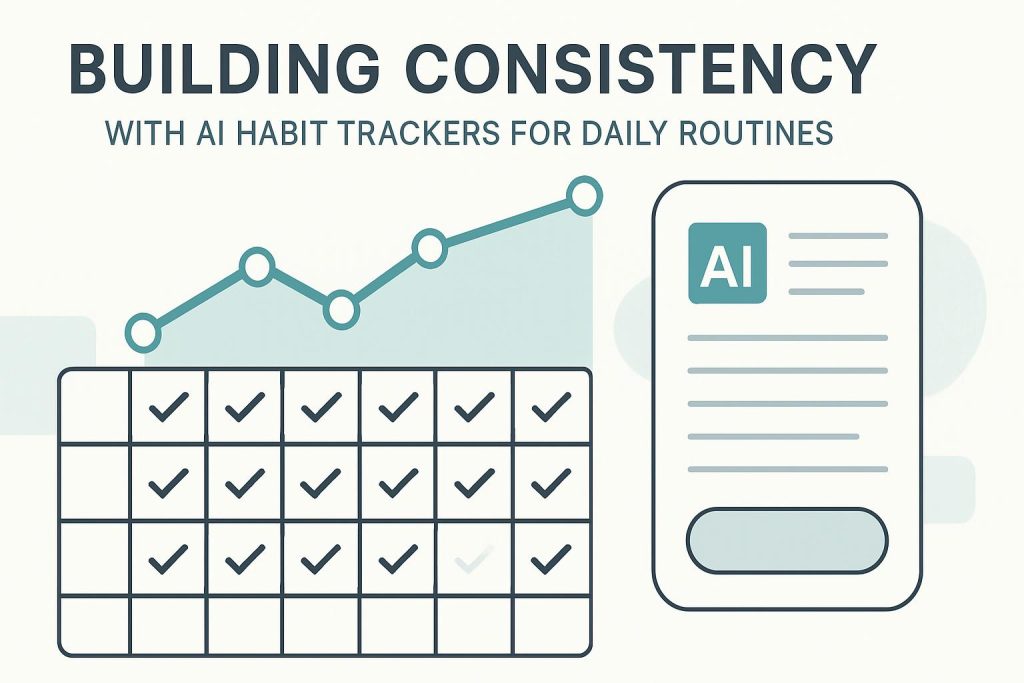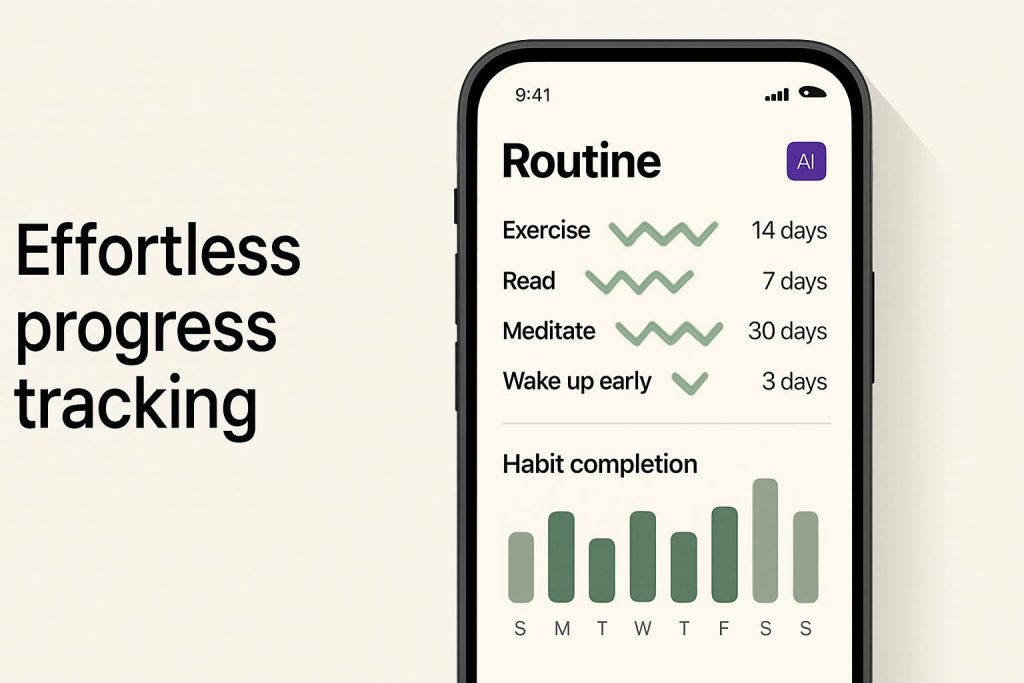Consistency. It’s the secret sauce behind almost every significant achievement. Whether it’s mastering an instrument, building a successful business, achieving fitness goals, or cultivating mindfulness, sporadic bursts of effort rarely yield lasting results. True transformation comes from showing up, day after day, even when motivation wanes. But let’s be honest: maintaining consistency in our daily routines is incredibly challenging in the face of distractions, shifting priorities, and the sheer unpredictability of life.
We start with the best intentions. We map out the perfect morning routine, schedule regular gym sessions, or commit to daily journaling. For a while, it works. But then, a busy week hits, an unexpected project lands on our desk, or we simply feel tired, and the carefully constructed routine crumbles. The missed days accumulate, momentum is lost, and soon we’re back to square one, feeling frustrated and perhaps a little guilty. Why is consistency so elusive, even for habits we genuinely want to build?
The core challenge lies in bridging the gap between intention and action, repeatedly, over long periods. Traditional methods like setting reminders or using simple checklists help, but they often lack the sophistication to adapt to our dynamic lives or provide the nuanced support needed to overcome common hurdles like forgetfulness, lack of immediate feedback, or dwindling motivation. They place the entire burden of maintenance squarely on our already taxed willpower and memory.
This is where AI habit trackers are changing the game. These intelligent applications go far beyond basic reminders. They leverage artificial intelligence to learn our patterns, personalize support, provide insightful feedback, and integrate seamlessly into our digital lives, making the path to consistency significantly smoother. They act less like passive logs and more like proactive partners in building the routines that underpin success.
In this article, we’ll explore how AI-powered habit trackers specifically address the challenge of building consistency in daily routines. We will cover:
- The fundamental role of consistency in achieving long-term goals.
- How AI features like smart scheduling, adaptive reminders, and progress visualization directly combat common obstacles to routine adherence.
- The power of data insights and pattern recognition in optimizing your daily habits.
- Examples of how different AI tools approach consistency, from effortless tracking to gamification and detailed analytics.
- Practical tips for leveraging AI trackers to build rock-solid daily routines that stick.
If you’re tired of the start-stop cycle and ready to build lasting positive changes, understanding how AI can foster consistency is the crucial next step. For more comprehensive details, view our guide: Mastering habits: AI tools for personal growth today
The cornerstone of achievement: why consistency matters
Before diving into AI solutions, let’s reinforce why consistency is paramount. It’s not just about repetition; it’s about the cumulative power of small, regular actions:
- Compounding Effect: Small efforts, performed consistently, compound over time to produce remarkable results. A daily 20-minute workout seems insignificant initially, but over a year, it adds up to over 120 hours of exercise. Writing 500 words daily leads to a novel-length manuscript. Saving a small amount consistently builds substantial wealth. Consistency unlocks the power of compounding.
- Skill Development: Mastery in any field requires consistent practice. Whether learning a language, coding, or playing a musical instrument, regular engagement reinforces neural pathways, builds muscle memory, and solidifies knowledge far more effectively than infrequent marathon sessions.
- Building Trust and Reliability: Consistency isn’t just internal; it affects external perceptions. Consistently meeting deadlines, responding promptly, or delivering quality work builds trust with clients, colleagues, and partners. Reliability is built on a foundation of consistent action.
- Reducing Decision Fatigue: When actions become routine, they require less conscious thought and willpower. A consistent morning routine, for example, automates a series of decisions, freeing up mental energy for more complex tasks later in the day.
- Creating Momentum: Each successful repetition of a habit builds momentum and self-efficacy. Seeing a streak grow or consistently hitting daily targets reinforces the belief that you can stick with it, making it easier to continue even when challenges arise.
- Identity Formation: Consistent actions shape our identity. When you consistently go to the gym, you start to see yourself as someone who prioritizes fitness. When you consistently journal, you become a reflective person. Habits don’t just change outcomes; they change who we are.
Despite these profound benefits, maintaining consistency remains a primary hurdle. Our brains crave novelty, our schedules are demanding, and immediate gratification often wins over long-term rewards. This is precisely where the intelligent features of AI habit trackers offer targeted support.
How AI fosters consistency in daily routines
AI habit trackers employ various sophisticated techniques to help users stay on track day after day. Here are some key mechanisms:
1. Smart scheduling and integration
One of the biggest enemies of consistency is simply forgetting or failing to find the time. AI tackles this head-on:
- Intelligent Time Slotting: AI tools can analyze your digital calendar (with permission) and suggest the most opportune times to insert your desired habits, minimizing conflicts and maximizing the chance of completion. Some tools can even automatically block out time for your habits, treating them like important appointments.
- Context-Aware Reminders: Instead of generic alarms, AI can trigger reminders based on context. For example, reminding you to practice mindfulness after a long meeting logged in your calendar, or prompting a water break if your fitness tracker detects a period of inactivity.
- Adaptive Reminders: If the AI notices you consistently miss a habit at a certain time, it might suggest trying a different time slot or ask if you want to adjust the frequency or duration, adapting to your real-world patterns rather than rigidly sticking to an initial plan.
- Routine Stacking Suggestions: Based on your existing logged habits or calendar events, AI might suggest “stacking” a new habit onto an existing one (e.g., “After your morning coffee, do 10 minutes of reading”), leveraging established routines to anchor new ones.
2. Data analysis and insightful feedback
Consistency thrives on feedback and understanding. AI excels at turning raw tracking data into actionable insights:
- Pattern Recognition: AI algorithms can sift through your check-in history to identify patterns. Do you consistently skip workouts on Fridays? Is your meditation habit stronger on weekends? Recognizing these patterns helps you understand your triggers and obstacles.
- Progress Visualization: AI generates more than just basic streak counts. It can create sophisticated charts showing consistency trends over time, completion rates for different habits, and progress towards larger goals. Visualizing progress, even small increments, is a powerful motivator. For instance, tools like Strides allow you to visualize success: using Strides for habit development through various chart types, making progress tangible.
- Correlation Analysis (Potential): Future AI might correlate habit adherence with other data points (e.g., sleep quality from a wearable, reported mood) to provide deeper insights like, “You’re more consistent with your morning routine on days after you get 7+ hours of sleep.”
3. Gamification and motivation engines
Making the process engaging is key to long-term adherence. AI can personalize motivational techniques:
- Dynamic Goal Adjustments: If you’re consistently exceeding a habit goal, the AI might suggest a slight increase to keep you challenged. Conversely, if you’re struggling, it might suggest temporarily lowering the target to help you regain momentum, preventing the all-or-nothing failure mindset.
- Personalized Encouragement: AI can offer tailored motivational messages based on your progress, streaks, or even identified patterns (e.g., “You’ve hit your writing goal 5 days in a row, keep the momentum going!”).
- Intelligent Reward Systems: Moving beyond simple points, AI could potentially tailor virtual rewards or recognition to your stated interests or progress on specific goals. Some platforms, like Habitica, excel at turning habit tracking into a game, letting you gamify your goals: achieve more using Habitica system by battling monsters and earning rewards for consistency.
4. Effortless tracking and reduced friction
If tracking feels like a chore, consistency suffers. AI aims to make tracking as seamless as possible:
- Automated Check-ins (Potential): Integration with wearables, location data, or other apps could allow AI to automatically log certain habits (e.g., detecting a gym visit via GPS, logging meditation time from a connected app), reducing manual input.
- Simplified Interfaces: Many AI-driven apps focus on clean, intuitive interfaces that make daily check-ins quick and easy. The goal is to minimize the friction associated with the tracking process itself. Platforms like Routine focus on this, aiming to help you track progress effortlessly with the Routine AI habit app.
Choosing your AI consistency partner
Selecting the right AI habit tracker depends on your individual needs and preferences:
- For Data Lovers: If you thrive on detailed analytics and visualizations, look for apps like Strides that offer robust charting and progress reports.
- For Gamification Fans: If turning habits into a game motivates you, Habitica is a prime example of leveraging RPG elements for consistency.
- For Seamless Integration: If you want a tool that fits neatly into your existing digital workflow, explore options like Routine or those integrating with calendar and task management apps.
- For Simplicity Seekers: If you prefer a straightforward, no-fuss approach, apps focusing on clean design and easy check-ins might be best.
Building routines that last with AI
AI habit trackers are powerful tools, but they work best when combined with proven habit-building strategies:
- Start Ridiculously Small: Make the initial habit so easy you can’t say no (e.g., meditate for 1 minute, do 1 push-up). Use the AI tracker to build the consistency muscle first, then gradually increase the difficulty as the AI suggests or as you feel ready.
- Focus on Identity: Frame your habits around the type of person you want to become (e.g., “I am someone who exercises regularly” rather than “I must exercise”). Let the AI tracker provide the data reinforcing this new identity.
- Use Implementation Intentions: Clearly define when and where you will perform your habit (“After I finish breakfast at the kitchen table, I will meditate for 5 minutes”). Input this into your AI tracker’s scheduling or reminder system.
- Optimize Your Environment: Make cues for good habits obvious and cues for bad habits invisible. Use the AI tracker’s insights to understand environmental factors affecting your consistency.
- Never Miss Twice: If you miss a day, prioritize getting back on track the next day. Use the AI tracker’s non-judgmental logging and motivational features to avoid the spiral of giving up.
Consistency is the bridge between your goals and reality. While the journey requires personal commitment, AI habit trackers provide intelligent scaffolding, making the process less daunting and more achievable. By leveraging smart scheduling, insightful feedback, personalized motivation, and reduced friction, these tools empower you to build the daily routines that pave the way for lasting personal growth.


